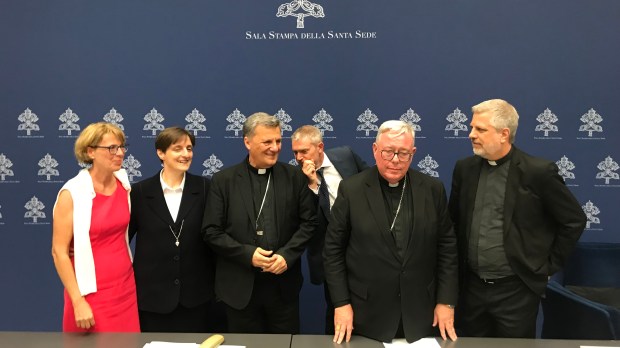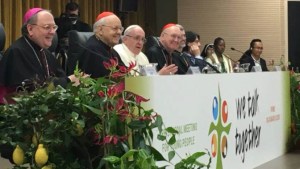The Synod on the Future of the Church has no ideological “agenda” and is not intended to change doctrine. That’s what the organizers said on June 20, 2023, when they presented the Instrumentum laboris, the working document that will serve as the basis for the work of the assembly next October.
The synod will bring together in Rome 370 representatives from across the Church. In particular, the document invites reflection on issues such as LGBTQ people, a female diaconate, and ordination of married men.
The Synod secretariat’s “greatest concern” has been “to always respect what emerged from the stages of the synod process,” said Cardinal Mario Grech, General Secretary of the Synod, rejecting the idea that “the Synod’s conclusions have already been written.” Thus the text manifests the reflections of both the local and continental stages of this major undertaking opened by Pope Francis in October 2021, he explained.
“We don’t have an agenda,” said Cardinal Jean-Claude Hollerich, Relator General for the upcoming synod. “There was no conspiratorial meeting between two cardinals with other people to see how to add progressive elements to the Church,” he added.
The questions proposed in the Instrumentum laboris consist only of “possible points for discussion,” continued the prelate from Luxembourg, pointing out that Pope Francis had “approved” these questions. “Perhaps other questions will be raised and other answers given… We are doing this with complete transparency,” he said.
A synod to learn
Synod leaders also brushed aside fears that the process would lead to doctrinal change. “This is a synod on synodality; it’s not a synod on homosexuality, nor on marriage and divorce,” Cardinal Hollerich firmly reiterated. “We’re not talking about Church teaching; that’s not our task, that’s not our mission,” he added.
Cardinal Grech criticized the tendency to polarize the debate between “conservatives” and “progressives.”
“We hasten to judge people… let’s leave the judging to the Lord,” he challenged, stressing that the Church’s mission was above all “to lead individuals to Jesus.”
As for the possibility of taking concrete action at the end of the assembly, the Maltese cardinal replied that the priority was to learn to practice synodality. “Once synodality has been strengthened and practiced, we will be in a position to respond to all these questions of today’s people,” he said. He also warned, however, that decisions would not be taken “in 2023 or 2024.”



